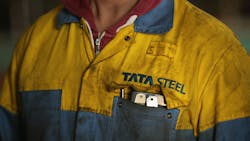Tata Names Chief to Stabilize Group Roiled by Mistry Ouster
For Tata Group’s new chairman, restoring order at India’s largest conglomerate will be atop his agenda after the ouster of his predecessor Cyrus Mistry triggered one of the country’s biggest corporate power struggles in years.
The conglomerate picked Tata Consultancy Services Ltd. Chief Executive Officer Natarajan Chandrasekaran on Thursday as the next chairman of group holding company Tata Sons Ltd. The 53-year-old executive has led TCS, the group’s biggest unit and Asia’s largest software exporter, since 2009, a tenure under which profits quadrupled and the stock tripled to make it India’s biggest company by market value.
The appointment expands Chandrasekaran’s role to lead a $100 billion conglomerate with dozens of divisions in businesses ranging from making luxury Jaguar sedans to writing code for Citigroup Inc. and selling table salt. The bitter public fight between scion Ratan Tata and Mistry -- who continues to battle his ouster in court -- has roiled the group for months and divided the nation’s business elite, many of whom sit on the boards of Tata companies.
“He builds relationships and this will come in useful when he deals with the heads of various companies at Tata Sons,” S. Mahalingam, former finance chief at Tata Consultancy, said in an interview. “He won’t be a micro-manager.”
The new chairman, an avid marathoner, will also have to work well with kingmaker Ratan Tata, as he re-asserts his dominance on the group, according to J.N. Gupta, co-founder and managing director of Stakeholder Empowerment Services, a proxy advisory firm. Ratan Tata had handpicked Mistry to succeed him, only to lead his ouster four years later on grounds of non performance.
“Tata Sons met today with a single point agenda to name Chandra,” Ishaat Hussain, a director at the parent company and chairman of Tata Consultancy, said by phone on Thursday. “I strongly supported the candidature of Chandra.”
Chandrasekaran, commonly known as Chandra, will start in his new role Feb. 21. The Tata Sons board will decide on Chandra’s tenure later, spokesman Debasis Ray said. Mistry, who is still a director on the board, didn’t attend Thursday’s meeting, he said.
Tata Consultancy named Chief Financial Officer Rajesh Gopinathan to replace Chandra, the software developer said in a statement on Thursday after reporting record quarterly profits. Tata Consultancy’s shares fell 4.1% in Mumbai, the most since Nov. 9.
Chandra is on the board of India’s central bank. He led Tata Consultancy’s Latin America and Japan expansion as the company sought to reduce its dependence on the U.S. Chandra joined Tata Consultancy after completing his post-graduation in computer engineering in India and has been with the group since 1987.
Under Chandra, TCS accelerated its overseas expansion and the company became the first among Indian software developers to cross $10 billion in annual revenue. TCS’s market value is now about 30% higher than the country’s second-largest company -- Reliance Industries Ltd. -- and more than double that of industry rival Infosys Ltd.
Chandra’s selection was welcomed by some of India’s business elite.
"Chandra, as he is fondly referred to, brings to the table an unparalleled track record of value creation and visionary leadership at TCS," billionaire Anil Ambani said in a statement. "Having run many marathons with him, I have the highest regard for Chandra’s spirit of endurance, grit, determination and focus."
Under Chandra, TCS became the title sponsor for the New York City marathon for eight years starting 2014. The company has been the title sponsor of the Amsterdam Marathon and had smaller sponsorship deals with races in New York, Boston, Chicago and Berlin, as well as running events in India.
He will need the endurance of a runner as challenges abound. One will come in the shape of Mistry’s accusations of poor governance within the group. The former chairman has filed a case in the National Company Law Tribunal asking the court to restrain Ratan Tata from attending board meetings and appoint an administrator to manage Tata Sons.
In an e-mail to directors after his dismissal, Mistry said the group may face 1.18 trillion rupees (US$17 billion) in writedowns over time because of five unprofitable businesses. He cited Indian Hotels Co., Tata Motors Ltd.’s passenger-vehicle operations, Tata Steel Ltd.’s European business, and the group’s power and telecommunications units as "legacy hotspots," according to the e-mail.
Mistry’s family owns about 18% of the holding company, while the charitable trusts started by the founding family control 66%.
The new chairman needs to “understand and develop a process of working with the Tata Trusts,” said Kavil Ramachandran, executive director of the Thomas Schmidheiny Center for Family Enterprise at the Indian School of Business. “He also needs to earn credibility and respect from the various group companies that are highly diverse in many ways.”
Chandra will need to watch out for these issues as soon as he starts:
Tata’s telecom partner NTT Docomo Inc. has gone to court seeking to enforce an arbitration award that the Indian group pay $1.17 billion. Tata Steel has booked more than $2.3 billion of writedowns on its U.K. and continental European operations, according to data compiled by Bloomberg. Mistry has said Ratan Tata’s Nano car project has been a drain on resources. Tata Motors resources in November said most of the investment in the Nano model’s development were written off according to accounting norms. The former chairman also said that the group’s hotel unit’s overseas acquisitions had left a large debt overhang and forced the company to sell properties at a loss.
“The first challenge of a new chairman is setting at rest all the controversies that have arisen in the removal of Cyrus Mistry,” said Rishikesha T. Krishnan, a professor at the Indian Institute of Management in Indore. “Secondly, there are large companies and investments in the Tata portfolio that need urgent attention.”
By P R Sanjai, Siddharth Philip and Saritha Rai
About the Author
Bloomberg
Licensed content from Bloomberg, copyright 2016.
